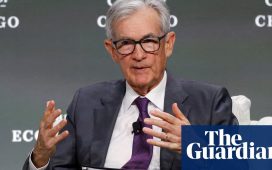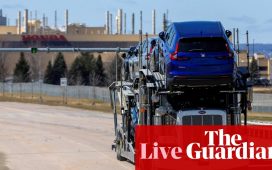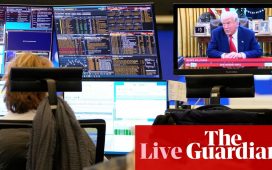Closing post
Time to recap….
The US economy has added more jobs than expected last month, but wage growth has cooled.
The US Non-Farm Payroll rose by 311,000 new hires last month, more than expected, but a slowdown on the blowout 504,000 recorded in January.
The unemployment rate rose to 3.6%, as more people looked for work.
The best news in the job report? More people are looking for work.
419,000 people entered the labor force in February.
The unemployment rate went up b/c more people are looking for jobs, not b/c of layoffs.This is good news. More workers are returning. pic.twitter.com/yphqeu1WCA
— Heather Long (@byHeatherLong) March 10, 2023
But the dollar weakened, with the data showing a slowdown in wage growth. Average hourly earnings for all private workers rose 0.2% versus 0.3% in January, with annual earnings up 4.6%.
Shares of some of the world’s largest banks have fallen as fears over the future of a small California lender ripple through the markets.
Investors were spooked by news that California-based Silicon Valley Bank, which primarily lends to tech startups, had launched an emergency share sale to shore up cash after revealing it had lost $1.8bn (£1.5bn) when it sold a portfolio of bonds in response to a decline in customer deposits.
SVB’s US-listed shares plunged 60% on Thursday but the rout also spread to other Wall Street stocks. Its shares were halted on Friday after tumbling 66% in premarket trading.
UPDATE: US regulators have now taken over Silicon Valley Bank.
The UK’s FTSE 100 index is down 149 points, or 1.9%, in late trading at 7,730. HSBC are down 5%, with Standard Chartered off 4.6% and Barclays losing 4.4%.
The UK economy grew faster than expected in January, we learned today.
GDP rose by 0.3%, helped by a return of schoolchildren to class after a flurry of illness in December, and Premier League football restarting after the World Cup.
The UK’s National Food Crime Unit (NFCU) is investigating a possible case of food fraud after a supermarket stocked beef with false British labels.
The UK regulator has told banks to consider slashing mortgage payments for borrowers struggling with rising bills, as it revealed that 356,000 homeowners could be at risk of missing their monthly instalments by summer 2024.
A payout for the boss of BP has been labelled a “kick in the teeth” for consumers battling the cost of living crisis, as chief executive Bernard Looney saw his pay package more than double to £10m after the oil and gas giant landed record profits linked to the war in Ukraine.
His package included a salary of £1.4m, a bonus of £2.4m – down fractionally on 2021 – and a £6m share award, as well as benefits. The total package was 120% more than the £4.5m he received in 2021.
The UK’s decision to delay the HS2 rail line will discourage British investment at a time when the US and mainland Europe are pushing forward with major spending on green technology, according to the chair of the National Infrastructure Commission.
Sir John Armitt said the delay to HS2, a high-speed line that aims to increase British rail capacity, contrasted with the heavy investments by the US and EU on decarbonisation.
And Boots is cutting the points per pound shoppers can earn on their loyalty card by a quarter, while offering discounts on its own-brand products.
The health and beauty chain told customers via email that from May, holders of the Boots Advantage card would collect 3p worth of points for every £1 spent, instead of 4p. They will keep the number of points they have already collected, which will still be worth the same amount.
Key events
Some US regional bank stocks are under pressure today, after the SVB crisis:
It’s not every day, thankfully, that a US bank fails, but SVB’s woes have also not caused Armageddon in the financial sector.
Neil Wilson of Markets.com explains:
Is SVB a worry? Tsy Sec Yellen said the US Treasury is watching “a few banks” but there is no sense of a wider panic even as some of the regionals were hit – deep early losses at the open were pared reasonably quickly and bank stocks came sharply off the lows. JPM bounced 3% and the S&P 500 banks index turned higher by 1.5%.
“We want to be very clear here… we do not believe there is a liquidity crunch facing the banking industry… the headwind for the banking industry is that the cost of liquidity is high and rising… This is a headwind for net interest margins, revenue and EPS” – Morgan Stanley.
US banking regulators take over Silicon Valley Bank
Some late breaking news: US regulators have shut down Silicon Valley Bank (SVB) and taken control of its customer deposits.
It’s the largest failure of a US bank since 2008, and came after the bank failed to raise new capital today.
Officials said they shut the bank to “protect insured depositors”.
The Federal Deposit Insurance Corporation (FDIC), which typically protects deposits up to $250,000, said it had taken charge of the deposits.
As we covered through the day, trading in SVB’s shares was halted after they plunged 60% yesterday, after revealing it had lost $1.8bn on a sale of securities – forcing it to look to raise funds.
The FT says it is the second-largest bank failure in US history after the 2008 collapse of Washington Mutual.
They add:
The bank had abandoned its efforts to raise $2.25bn in new funding to cover losses on its bond portfolio earlier in the day and had been looking for a buyer to save it, according to people with knowledge of the matter.
Closing post
Time to recap….
The US economy has added more jobs than expected last month, but wage growth has cooled.
The US Non-Farm Payroll rose by 311,000 new hires last month, more than expected, but a slowdown on the blowout 504,000 recorded in January.
The unemployment rate rose to 3.6%, as more people looked for work.
The best news in the job report? More people are looking for work.
419,000 people entered the labor force in February.
The unemployment rate went up b/c more people are looking for jobs, not b/c of layoffs.This is good news. More workers are returning. pic.twitter.com/yphqeu1WCA
— Heather Long (@byHeatherLong) March 10, 2023
But the dollar weakened, with the data showing a slowdown in wage growth. Average hourly earnings for all private workers rose 0.2% versus 0.3% in January, with annual earnings up 4.6%.
Shares of some of the world’s largest banks have fallen as fears over the future of a small California lender ripple through the markets.
Investors were spooked by news that California-based Silicon Valley Bank, which primarily lends to tech startups, had launched an emergency share sale to shore up cash after revealing it had lost $1.8bn (£1.5bn) when it sold a portfolio of bonds in response to a decline in customer deposits.
SVB’s US-listed shares plunged 60% on Thursday but the rout also spread to other Wall Street stocks. Its shares were halted on Friday after tumbling 66% in premarket trading.
UPDATE: US regulators have now taken over Silicon Valley Bank.
The UK’s FTSE 100 index is down 149 points, or 1.9%, in late trading at 7,730. HSBC are down 5%, with Standard Chartered off 4.6% and Barclays losing 4.4%.
The UK economy grew faster than expected in January, we learned today.
GDP rose by 0.3%, helped by a return of schoolchildren to class after a flurry of illness in December, and Premier League football restarting after the World Cup.
The UK’s National Food Crime Unit (NFCU) is investigating a possible case of food fraud after a supermarket stocked beef with false British labels.
The UK regulator has told banks to consider slashing mortgage payments for borrowers struggling with rising bills, as it revealed that 356,000 homeowners could be at risk of missing their monthly instalments by summer 2024.
A payout for the boss of BP has been labelled a “kick in the teeth” for consumers battling the cost of living crisis, as chief executive Bernard Looney saw his pay package more than double to £10m after the oil and gas giant landed record profits linked to the war in Ukraine.
His package included a salary of £1.4m, a bonus of £2.4m – down fractionally on 2021 – and a £6m share award, as well as benefits. The total package was 120% more than the £4.5m he received in 2021.
The UK’s decision to delay the HS2 rail line will discourage British investment at a time when the US and mainland Europe are pushing forward with major spending on green technology, according to the chair of the National Infrastructure Commission.
Sir John Armitt said the delay to HS2, a high-speed line that aims to increase British rail capacity, contrasted with the heavy investments by the US and EU on decarbonisation.
And Boots is cutting the points per pound shoppers can earn on their loyalty card by a quarter, while offering discounts on its own-brand products.
The health and beauty chain told customers via email that from May, holders of the Boots Advantage card would collect 3p worth of points for every £1 spent, instead of 4p. They will keep the number of points they have already collected, which will still be worth the same amount.
Larry Elliott: Economic growth of sorts, but UK plc is going nowhere
The UK economy is ‘going nowhere’, warns our economics editor Larry Elliott.
Following this morning’s GDP report, showing 0.3% growth in January – but no growth over the last year – he writes:
Jeremy Hunt took comfort from the fact the economy is showing more resilience than expected but rightly noted there was a “long way to go”. The good news for the chancellor is that the recession predicted by the Bank of England last November has yet to materialise, and even if it does come to pass is likely to be shorter and more shallow than expected last autumn. Higher growth means stronger tax receipts, lower borrowing and some extra wriggle room for Hunt in next week’s budget.
The bad news is that it is going to be some time before the economy benefits from lower global gas prices and falling inflation. GDP is not going to do much more than edge sideways again this year, if that, and even after beating forecasts in January it is still possible the economy will contract in the first quarter. The boost to private healthcare noted by the ONS is an indication of the effect on the economy of this winter’s widespread industrial action.
skip past newsletter promotion
Pound rallies against dollar after GDP and jobs report
Sterling is on track for its best day against the US dollar since the first week of January.
The news that the UK economy grew faster than expected in January has boosted the pound, while the mixed US jobs report weakened dollar.
Analysts say the 0.3% increase in GDP in January, ahead of forecasts of a 0.1% gain, has eased fears of a recession.
Matthew Ryan, head of market strategy at Ebury, explains:
“At this stage, we are far from convinced that a technical recession in 2023 is the foregone conclusion that many in the market have made out.
We think that the resilience of the UK economy will provide decent support for the pound in the coming months.”
The pound is currrently up 1.4% against the dollar at $1.2090, its biggest jump against the greenback since 6 January.
John Cronin, a financial analyst at the stockbroker Goodbody, believes the sell-off in UK bank stocks is unwarranted.
As covered this morning, shares in UK-listed banks fell amid the jitters created by Silicon Valley Bank’s emergency share sale to raise cash, after it incurred a $1.8bn on the sale of bonds.
Cronin points out that given that deposits at most big banks come from the retail market rather than tech startups, and that those same lenders would have to unwind the “enormous” cash balances held by the Bank of England before selling off any of their investment portfolios.
Furthermore, UK lenders also hedge risks linked to those portfolios.
Analysts say today’s sell-off in UK bank stocks, sparked by Silicon Valley Bank’s troubles, is unwarranted
“We don’t believe there is any readacross to the Irish and UK banks” https://t.co/9dZvWsQeM0
— Kalyeena Makortoff (@kalyeena) March 10, 2023
Silicon Valley Bank’s UK arm has issued a statement, pointing out that it is a “standalone independent banking institution” that is regulated and governed by the Prudential Regularory Authority in the UK.
It says:
Silicon Valley bank UK has been an independent subsidiary since August 2022 with a separate balance sheet to the SVB Financial Group and an independent UK Board of directors.
Silicon Valley Bank UK fully abides by the UK regulatory requirements as covered by the Financial Services Compensation Scheme and by the Financial Ombudsman Service. SVB UK, Ltd. is ring-fenced from the parent and its other subsidiaries.
Erin Platts, CEO and head of EMEA, says the bank has received support from its community of investors and start-up founders:
SVB has supported investors and innovators for 40 years and we have been so humbled with the consistent drum of support coming from our UK investor and founder community in last few days.
We appreciate that this is a concerning time for our clients so we are working tirelessly to support them and give more context”
Wall Street has opened slightly lower, with the main indices down around 0.2%.
DOW JONES DOWN 66.29 POINTS, OR 0.21 %, AT 32,188.57 AFTER MARKET OPEN
S&P 500 DOWN 8.21 POINTS, OR 0.21 PERCENT, AT 3,910.11 AFTER MARKET OPEN
NASDAQ DOWN 21.26 POINTS, OR 0.19 PERCENT, AT 11,317.10 AFTER MARKET OPEN
— alfred (@macronewswire) March 10, 2023
#SVB Shares Halted for Pending News After Sinking Another 69% ( Source… Bloomberg)
— Biren Vakil Paradigm (@Birenvakil) March 10, 2023
Back in the troubled banking sector:
SVB Financial Group’s efforts to raise money have failed and the troubled bank was in talks to sell itself, CNBC reported on Friday, as a crisis at the tech-heavy lender rippled through global markets and hit banking stocks.
Shares of SVB Financial Group were halted on Friday after tumbling 66% in premarket trading.
SVB, which does business as Silicon Valley Bank, was not immediately available for comment, Reuters reports.
US job creation is still running well over the historic average, despite slowing to 311,000 new jobs in February.
And while that’s excellent news for workers, it may encourage the US Federal Reserve to keep tightening monetary policy, raising interest rates to cool inflation.
Nathaniel Casey, Investment Strategist at wealth manager Evelyn Partners, explains:
Despite reporting above consensus estimates, today’s jobs report saw NFPs revert closer to recent trends after January’s gain of 517k. The unemployment rate increased slightly to 3.6%.
With January’s payrolls figure seemingly an anomaly and wage growth continuing to slow, the Federal Reserve can feel slightly more optimistic that a tight labour market will not stoke inflation further.
However, the Fed still has more work to do with NFP’s running well above the post-Second World War monthly average of 123k.
Despite a slowdown in job creation signalling relatively bad news for the economic outlook, it will be seen as good news to markets, Casey adds:
During Fed chair Powell’s testimony to Congress earlier in the week, he noted that recent economic data – including employment – had partly reversed the softening seen during the end of 2022. He went on to note that if economic data was to continue to revert those softening trends, the Fed would be prepared to ‘increase the pace of rate hikes’ to regain price stability.
With the Jobs data now softening again and the unemployment rate ticking up, the market can feel slightly relieved that the likelihood of the Fed increasing the pace of hikes has fallen for the time being.
The labour force participation rate among ‘prime-age’ workers (ages 25 to 54) in the US has risen to its levels in early 2020.
That suggests that the workers who left the labor market during the pandemic have been returning – either finding jobs or looking for them.
Average hourly earnings growth has slowed to 0.2% month-on-month, from 0.3%, the US jobs report shows.
On an annual basis, average hourly pay growth was weaker than expected, at 4.6%.
US unemployment rate rises to 3.6%
The US unemployment rate has edged up to 3.6% for February, with the number of unemployed persons rising to 5.9 million, the Bureau of Labor Statistics reports.
There were notable job gains across US leisure and hospitality companies, retail trade, government, and health care.
But employment declined in the information sector, and in transportation and warehousing.
US created 311,000 jobs in February
Newsflash: Job creation across the US slowed last month, but more jobs were created than expected.
The Non-Farm Payroll, a closely-watched measure of US employment, rose by 311,000 in February, rather stronger than the 205,000 which was expected.
That follows a (downwardly revised) 504,000 in January. January’s non-farm payroll increase had initially been estimated at 517,000 jobs last month.









